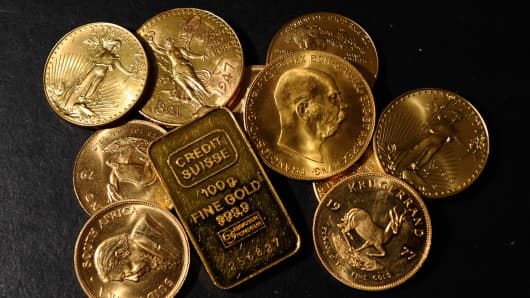The price of gold may be due a "last hurrah" after deflating earlier this year as an equity market rally made its safe haven status less attractive.
The gold price has been dented by events like the possibility the Bank of Cyprus might sell off its reserves in April, which led to the metal losing nearly 16 percent of its price in three days' trading.
Speculation about a reduction in the U.S. Federal Reserve's bond-buying program also hit the metal, and on Thursday its price fell by 3.2 percent – the biggest drop in four months – before edging up to $1,326.48 an ounce on Friday morning.
A new report by Thomson Reuters, however, argued that the price of the metal has been supported in the first half by "Chinese aunties" buying up jewelry in response to falling prices. The amount of gold being made into jewelry soared by 41 percent or nearly 100 tons, to a record of 345 tons, in China in the first half of the year.
The gold price could have a "last hurrah" in the last three months of the year, to hit $1,500 again in early 2014, before falling to an average $1,350 per ounce in 2014, according to Rhona O'Connell, head of metals research and forecasts at Thomson Reuters.
(Read more: Why Gartman got gold wrong)
"We think that the vast majority of the weak-handed holders are out of the market, so there could be a last hurrah in the fourth quarter," she told CNBC.
The influence of exchange-traded funds (ETFs), one of the most important factors in keeping gold prices high since the credit crisis, is now waning, O'Connell said. There is also the risk that investors who have had their fingers burnt by the metal's price falls this year won't be eager to return to the market.
(Read more: Gold predictions for 2014)
"The majority of people who are out, they will stay out," O'Connell said. "However, there's another constituency. As asset prices in equities are on the up, there's an argument for an increase in gold holding because of the work it does in expanding the efficient frontier. People who want to hedge their portfolios will return as buyers."



